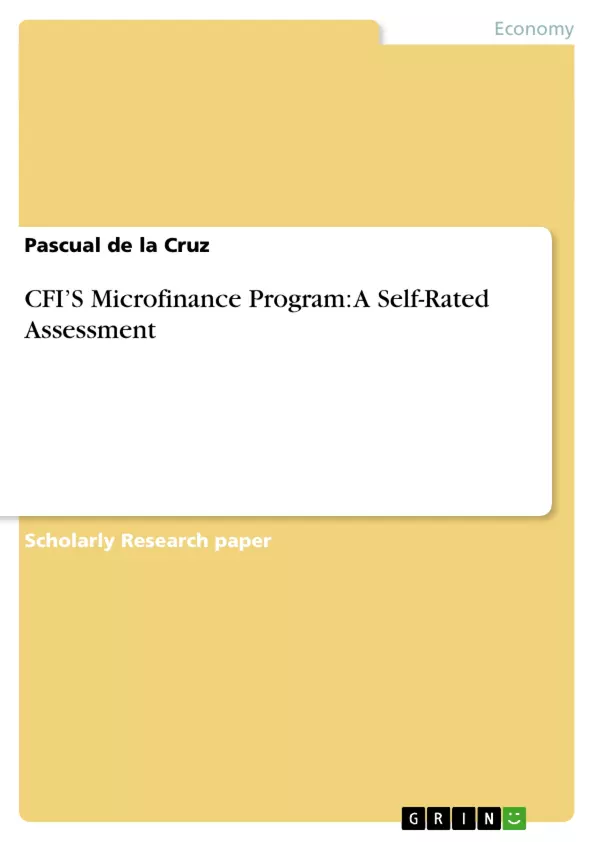This study determined the impact of CARE Foundation’s micro-finance programs on its member-beneficiaries. The instrument used was as “self-rating” survey designed to draw out the perception of the member-beneficiaries on the impact of CARE’s programs and services to fourteen (14) important aspects of their socio-economic lives.
The study used a descriptive and narrative research design. Analysis and presentation of the results used an evaluation and assessment method mainly based on the averages of the responses of the respondents. Interpretation of the results was limited on the perspectives of the respondents who were member-beneficiaries of CARE.
The results of the study showed that the respondent member-beneficiaries believed there was a significant improvement in the socio-economic live of the respondents. Percentage share of “no” responses to the total responses was minimal. The results showed a 70-30 ratio for the improvement (YES) and no improvement at all (SAME) responses.
These findings led to the conclusion that CARE programs and services had a relatively significant impact on the lives of the CARE members in all fourteen (14) areas of concerns, notable of which were improvements in the quality of family life, family decision-making, social and spiritual lives, knowledge about family, self and business, dreams, personal happiness, education of the children and food on the table.
It is recommended that government and other agencies should provide an environment conducive to the success and expansion of microfinance in the country.
Inhaltsverzeichnis (Table of Contents)
- ABSTRACT
- BACKGROUND
- CARE Programs and Services
- Selection of CARE Members
- CARE Performance
- STATEMENT OF THE PROBLEM
- HYPOTHESIS OF THE STUDY
- SCOPE AND LIMITATION
- SIGNIFICANCE OF THE STUDY
Zielsetzung und Themenschwerpunkte (Objectives and Key Themes)
This study aims to evaluate the perceived impact of CARE Foundation's microfinance programs on its member-beneficiaries. The research focuses on the beneficiaries' self-reported experiences and assessments of how CARE's programs and services have affected their socio-economic lives.
- Impact of CARE's microfinance programs on member-beneficiaries
- Self-rated assessment of socio-economic improvements
- Comparison of first-time and second-time loan recipients' perceptions
- CARE's holistic approach to development, including financial and non-financial services
- CARE's organizational structure, performance, and impact
Zusammenfassung der Kapitel (Chapter Summaries)
- ABSTRACT: This section introduces the study's objective, methodology, and key findings. It highlights the self-rated survey used to assess the impact of CARE's programs on its members. The study found that members perceived significant improvement in their socio-economic lives, particularly in areas related to family life, decision-making, and overall well-being.
- BACKGROUND: This chapter provides background information on CARE Foundation's origins, mission, and organizational structure. It explains the motivation behind establishing CARE as a non-profit organization focused on assisting low-income Filipinos.
- CARE Programs and Services: This chapter details the core programs and services offered by CARE, including the Group Model Loan, Capital Build-Up, Micro-insurance, and Entrepreneurial Development Services. The chapter explains the methodology behind the Group Model Loan, which is based on the Grameen methodology, and emphasizes the importance of mutual guarantee and holistic development in CARE's approach.
- Selection of CARE Members: This section outlines the criteria used to select CARE members, focusing on the target population of women who are economically active but marginalized. It highlights the requirements for membership, including age, income-generating activities, and credit history.
- CARE Performance: This chapter showcases CARE's performance and growth over its initial eight months of operation. It provides data on membership, loan disbursement, and collection efficiency, highlighting CARE's success in achieving its financial goals. It also discusses the organization's commitment to social responsibility and ensuring the sustainable utilization of its resources.
- STATEMENT OF THE PROBLEM: This section formally presents the research questions guiding the study, which aim to assess the perceived impact of CARE's programs on its members, focusing on their socio-economic lives and comparing first-time and second-time loan recipients.
- HYPOTHESIS OF THE STUDY: This section outlines the primary assumption guiding the research, which postulates that there is a positive impact of CARE's programs on its members' lives, with second-time loan recipients experiencing slightly higher self-rated improvements.
- SCOPE AND LIMITATION: This chapter clarifies the scope and limitations of the study, emphasizing that it is a self-rated assessment based on the subjective perceptions of the members. The study focuses on the impact of CARE's programs on its members and does not aim to provide a broader evaluation of the microfinance industry.
- SIGNIFICANCE OF THE STUDY: This section highlights the value of the study's findings for the Board of Trustees and officers of CARE Foundation. It emphasizes the importance of understanding the members' perceived impact of the programs for improving the organization's services and strategies.
Schlüsselwörter (Keywords)
This research centers around the impact of microfinance programs on socio-economic improvement, self-rated assessments, member-beneficiaries, and holistic development. The study explores the implementation and effectiveness of CARE Foundation's microfinance program, emphasizing their unique Group Model Loan approach based on the Grameen methodology. Other key themes include mutual guarantee, entrepreneurial development services, and the organization's performance and impact on its members.
Frequently Asked Questions
What is the CARE Foundation's microfinance program?
It is a program designed to provide financial and non-financial services, such as Group Model Loans and entrepreneurial training, to low-income and marginalized individuals in the Philippines.
How does the Group Model Loan work?
Based on the Grameen methodology, it relies on mutual guarantees within a group of members, promoting collective responsibility and support.
What were the key findings of the self-rated assessment?
70% of beneficiaries reported significant improvements in their socio-economic lives, including better family life, happiness, and education for their children.
Who are the primary targets of CARE's services?
The program specifically targets economically active but marginalized women who need capital for their small business activities.
What non-financial services does CARE provide?
Beyond loans, CARE offers micro-insurance and Entrepreneurial Development Services to ensure holistic growth for its members.
- Quote paper
- Pascual de la Cruz (Author), 2012, CFI’S Microfinance Program: A Self-Rated Assessment, Munich, GRIN Verlag, https://www.grin.com/document/202397



